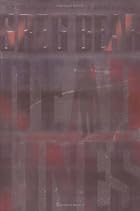Greg Bear narrows the line between horror and science fiction in this novel. The plot involves a new communications technology that promises to revolutionize the cell phone. It promises zero distortion and complete connectivity. But using the phone seems to free the dead to return.
The first problem I encountered is the feeling that this isn’t what people want. We repeatedly are willing to sacrifice communications quality for data rates. Ok, so I’m surprised Greg Bear missed that.
The main character is somewhat unbelievable. I couldn’t empathize with him. He is a director of porn theater. But his female leads respect him too much. And the reasons for his involvement in the phone business don’t seem reasonable.
Then he had to rely on a pop-in character, a psychic, to explain how the technology works and why it’s a problem. The character never appeared again. I really expect an experienced writer to avoid plot devices like this. It didn’t even feel like it fit into the story.
Too much was unexplained in the book. We don’t know why the phone interferes with the process of death. Why are the dead appearing to people. What happened in Europe? It seemed to be a major event and harbinger of things to come, and we never hear of it again.
The end of the book felt premature and anticlimactic. I really feel like I missed something, maybe I did?
I normally really like Greg Bear, he has written some excellent science fiction with some good takes on the latest science. This book doesn’t fit.


